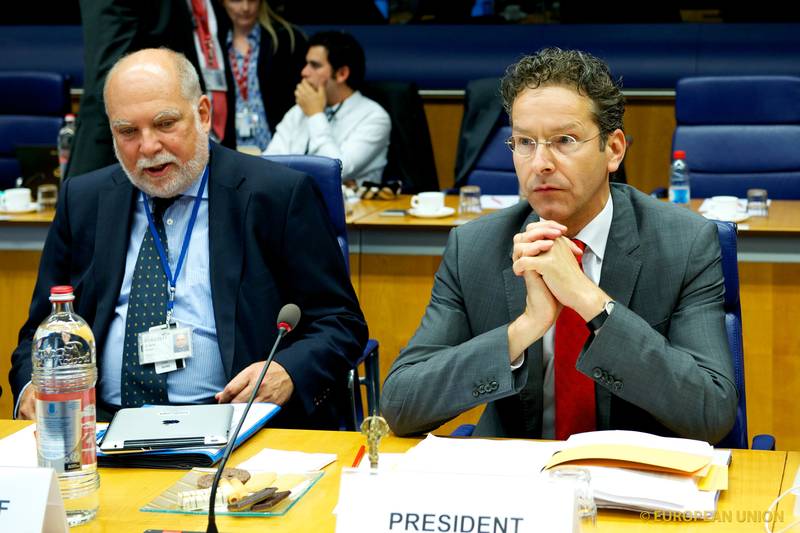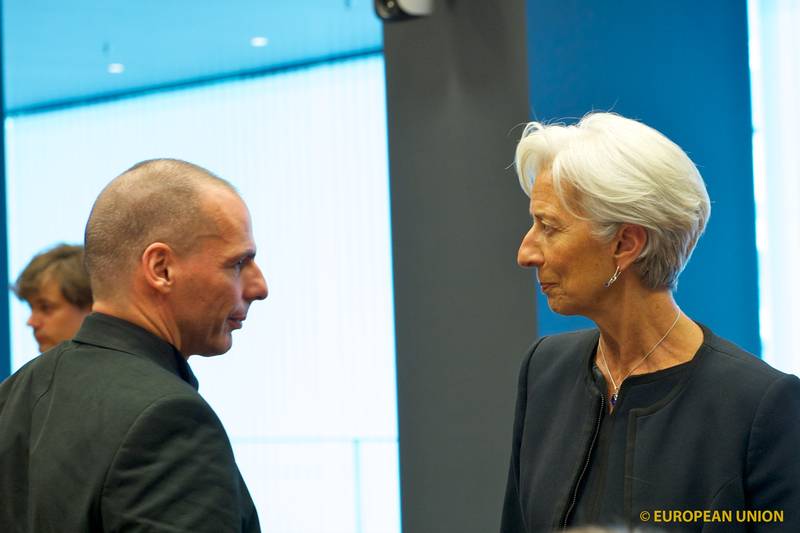How Long to the Grexit?
Adelina Marini, June 20, 2015
 The tired faces of the ministers representing the institutions before the Eurogroup meeting on Thursday turned into grim expressions after the session, which was longer than anticipated, considering the outcome. And if their faces, after uttering several worrisome lines, were not enough, the fact that European Council president Donald Tusk called the same day for an emergency summit of Eurozone leaders on Monday shows the situation is really serious. Before the leaders there is also going to be a meeting of the Eurogroup.
The tired faces of the ministers representing the institutions before the Eurogroup meeting on Thursday turned into grim expressions after the session, which was longer than anticipated, considering the outcome. And if their faces, after uttering several worrisome lines, were not enough, the fact that European Council president Donald Tusk called the same day for an emergency summit of Eurozone leaders on Monday shows the situation is really serious. Before the leaders there is also going to be a meeting of the Eurogroup.
How scary is it?
Everyone in the Eurozone and the Troika made it very clear that the end is near. One of Greece most fervent advocates before the meeting - Economic Commissioner Pierre Moscovici (France, Socialists and Democrats) - said with disappointment in his voice after it “We all knew that today’s meeting was going to be difficult. I hoped it would be useful. We're waiting for credible counter-proposals. The ball really is still in the Greek authorities' court. There’s not much time left to avoid the worst”. Eurogroup boss Jeroen Dijsselbloem (Netherlands, Socialists and Democrats) did not sound as desperate but with an extremely serious face he announced that unfortunately no progress had been made.
According to him, there is still time to come to an agreement but this will require another extension of the program, whose first extension expires on June 30. The reason is that even if an agreement is reached right now it still needs to go through parliamentary procedures in some of the Eurozone member countries. This would be impossible to happen by the end of June. Hence the need for another extension. How long – he did not yet know.
International Monetary Fund leader Christine Lagarde looked not just serious but rather angry after the meeting, even losing her cool and saying she expected to negotiate with grownups. She emphasised several times that Greece’s proposals needed to be credible for the IMF extends loans from the money of its 188 members – from the poorest countries in the world to the wealthiest. Mr Dijsselbloem added that there were no painless solutions. Truly difficult measures need to be taken which requires politicians who are ready to tell their people the truth. There is no easy way out, said the Dutch finance minister, adding that if it is impossible for Greece to remain in the Eurozone there is preparedness for any scenario.
After the end of the Eurogroup meeting on Thursday night few of the ministers were willing to talk. Fatigue and frustration were notable on their faces. The Finnish minister of finance was among the few that stopped to talk to journalists, although at first he sighed wearily and said he just wanted to go back to his hotel. He did, however, spare a minute and a half to say that any new proposition from Greece must first pass through the technical negotiation team. His Maltese colleague Edward Scicluna was a little more optimistic in saying he was not expecting anything to happen at the end of the month. He did not name it by its real name – Grexit – but that’s exactly what he meant. According to him, it is high time for more transparency.
Negotiations are secret by rule and there is a good reason for this, but when they are failing or as is the case now are blocked it is essential that people in Greece and the other Eurozone countries to be aware what the Greek government has offered or was offered. That way people will be able to make an informed decision whether Greece needs to be helped in spite of all, or else say “it's their fault and we're sorry”. He added that public opinion must be known and it will influence events on its own.
Greek Minister of Finance Yanis Varoufakis’s press conference on the other hand was like coming from a different planet. Unlike his Eurogroup colleagues he looked his usual self – slightly cocky, with the usual smiles, witticisms, even ending with a joke that brought dead silence. As if to set in stone the conviction that there are problems with understanding in the EU he began in Greek and after the exhausted pleas of foreign journalists to speak in English he stressed he was going to reply in the language he was asked in. The press conference dragged for too long and what was said did not make the Babylonian torment worth it.
It became clear from the Greek minister’s words that he presented to his colleagues basically a magic wand that could solve the present situation and even the whole crisis “tonight”. The magic wand is a proposal he named “comprehensive”. Later in his blog Yanis Varoufakis published what is claimed to be his speech at the Eurogroup, accompanied by the following introduction: “The only antidote to propaganda and malicious ‘leaks’ is transparency. After so much disinformation on my presentation at the Eurogroup of the Greek government’s position, the only response is to post the precise words  uttered within. Read them and judge for yourselves whether the Greek government’s proposals constitute a basis for agreement.”
uttered within. Read them and judge for yourselves whether the Greek government’s proposals constitute a basis for agreement.”
The text is quite long, most of it the usual mix of emotion, philosophically-economic views and selective presentation of facts. Both at the press conference and in this text the Greek game theory specialist cited the recently published blogpost of IMF senior economist Olivier Blanchard on what should be the size of the correction Greece must make. He did not, however, mention the part of Blanchard’s analysis where it says the Greek pension system is the most expensive in Europe and serious cuts must be made.
The essence of the Greek proposal is in three parts. First one is deep reforms. This includes the “news” in Mr Varoufakis’s proposal – instituting an automatic deficit brake. The problem is Greece has already committed to such break by signing the fiscal compact in 2012. According to Article 4 of the compact, any country whose debt-to-GDP ratio exceeds 60% must take action to lower it by 1/20 per annum. Sanctions are provided for non-compliance with the rules. Second part of the Greek plan is restructuring the debt. It is an old idea that the Greek government pushes up again as a demand. Part of this debt restructuring is a an interinstitutional bond swap.
In return for this exchange Athens promises to carry through “a program of deep reforms” with provisions for the successful completion of the current program and providing for a new agreement. Third part of the plan is an investment program financed by Juncker’s investment plan. “Does anyone truly doubt that this three-part announcement would dramatically change the mood, inspire Greeks to work hard on hope of a better future, invite investors to a country whose asset prices have fallen so dramatically, and give confidence to Europeans that Europe can, even at the 11th hour, do the right thing?”, asked Mr Varoufakis at the end of his long speech.
According to him if this proposal was accepted by his Eurogroup partners the crisis would have ended last night. The problem with the “plan” is that it lacks actual numbers, costing each measure and assuring creditors that it is worthwhile continuing to grant funds to the Greek government at low interest. Many of the ministers last night even refused to discuss the offer. Alexander Stubb, minister of finance of Finland, reminded that the correct procedure was the new proposal to go first through the technical group and then be presented to the ministers for discussion. Others also shared that they were not seeing numbers and timeframes.
When will the grownups come?
Meanwhile, Greek Prime Minister Alexis Tsipras is in Moscow, where he was assured Greece’s plea for a loan could be granted. He, too, did not look at all worried by the events of the evening of June 18, one of the last possible dates for reaching an agreement. His finance minister without rhyme or reason made a perplexing joke, after which a dead silence came down in the overcrowded room. The joke came as a response to a question about the possibility of enforcing capital controls to banks to avoid bank runs. There are two people on a golf course and one of them says: "I'll tell you how I became rich. My business burnt down. I collected the insurance and I decided to live on it". The other one says: "Well, something similar happened to me. My business was flooded. I collected the insurance and I'm living happily ever after". And the first guy says to him: "How do you start a flood?".
After the total silence that ensued Yanis Varoufakis had to answer questions on VAT rates and pensions. We heard the well-familiar answers – we do not accept the Troika’s proposals, but we have none of our own. According to Varoufakis, the problem with VAT is poor collection. This problem will not be solved by raising the rate to 23% as the institutions are offering. He did not say how he proposes to increase collection rate and it was missing from his “plan” presented on Thursday. The whole discussion re-states Christine Lagarde’s question if it is possible for the Greek government to grow up over the weekend so they can sit as an adult at the negotiation table during the special Eurogroup meeting and at the table of Eurozone leaders.
 No one wants yet to come out and say out loud that a possible Grexit would be discussed at these meetings. Some leaders are calling for anything possible to be done to broker a deal, obviously willing to make concessions. Among them is French president François Hollande. Others are adamant that no more compromises should be made with Greece. Such is the opinion of Slovak Prime Minister Robert Fico. Austria also thinks that a possible Grexit should not be taken lightly, while the attitude in Berlin is rather one of preparation for the exit. The key question is whose views will prevail. On one hand there is the geopolitical risk of Russia welcoming such developments that lend it a more serious access to the Balkans. On the other hand is the Eurozone instability. Leaving Greece in its current condition, with the current attitudes of its politicians foreshadows turning the crisis into a permanent one which will surely demoralise the other members as well.
No one wants yet to come out and say out loud that a possible Grexit would be discussed at these meetings. Some leaders are calling for anything possible to be done to broker a deal, obviously willing to make concessions. Among them is French president François Hollande. Others are adamant that no more compromises should be made with Greece. Such is the opinion of Slovak Prime Minister Robert Fico. Austria also thinks that a possible Grexit should not be taken lightly, while the attitude in Berlin is rather one of preparation for the exit. The key question is whose views will prevail. On one hand there is the geopolitical risk of Russia welcoming such developments that lend it a more serious access to the Balkans. On the other hand is the Eurozone instability. Leaving Greece in its current condition, with the current attitudes of its politicians foreshadows turning the crisis into a permanent one which will surely demoralise the other members as well.
It has been going for six years and if the present ideology is sustained it is hardly likely anything will change. At the same time, eurosceptic parties are becoming unavoidable factors in more member countries. At the Danish parliamentary election held too on June 18 the anti-immigration People's Party came second with 21% of the vote. Leaving aside the continuing triumph of eurosceptic and nationalist parties it must be taken into consideration that a new season of the Greek drama will mean a serious delay in intensifying the integration within the common currency zone. The second report of the four presidents, containing long-term visions with opening-up the treaties for changes is going to be presented at the Brussels summit end of next week.
However, this is not happening until trust among member countries is fully re-established. Preserving the Greek status quo renders this absolutely impossible. Thus the main question the leaders must answer on Monday is not what more can be done, but rather is an agreement with SYRIZA possible at all. Unfortunately the answer is self-evident. Greek citizens, however, seem already to be feeling the great danger and gathered on Thursday night to a mass rally in favour of Greece remaining within the currency block. A solution can be sought in a combination of concessions by the Eurozone and a possible change of governments in Greece. It is too early to predict whether such a solution would be sustainable in the long run for there are no guarantees elections would not be won by an even more-radical political version. It is a totally possible scenario for all, besides the radicals, are well aware that, unfortunately, there is no painless solution to Greece’s problems.
 Klaus Regling | © Council of the EU
Klaus Regling | © Council of the EU Mario Centeno | © Council of the EU
Mario Centeno | © Council of the EU Mario Centeno | © Council of the EU
Mario Centeno | © Council of the EU